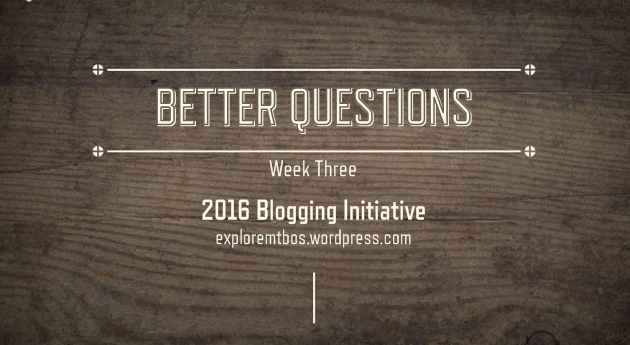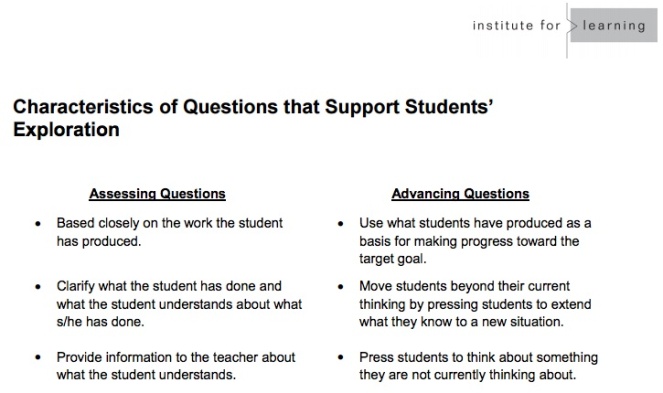
This week I have really been thinking about questioning. Actually, lets be honest. I think about questioning ALL. THE. TIME. Several years ago when our state first made the shift to CCSS, I had so much training in preparation. One of the trainings I was very excited and very nervous about was working with IFL (Institute for Learning) with the University of Pittsburg. They asked to video tape my class to be able to show assessing and advancing questions in a summer training. (By the way, IFL worked very closely with my state when we first made the transition and therefore supplied all of our summer training for several years). In order to prepare for recording the lesson, I had to work through a task and create a series of assessing and advancing questions for situations that I thought might come up when I was actually teaching the lesson. I had to anticipate what and how my students would interpret and work through the tasks. It was super time consuming and because I was doing it for the first time and by myself actually really difficult.

But after hashing it out and then actually teaching the lesson, I realized that all of the planning was the best thing I could have possibly done for my students’ learning! Now, I’m not saying that the lesson was flawless. Nor am I saying that I successfully anticipated every way of thinking my students showed. But because I had a plan of questions, I was better at thinking on my toes. And I knew the things I needed to ask in order to help my students learn the material because I knew my end goal. And then the next time I planned a lesson using assessing and advancing questions it was much easier. It continues to be easier and easier every time I do it.
Now, as a new instructional coach, I have been struggling with how to help my teachers realize how invaluable this knowledge can be. It’s hard to be vulnerable and plan in this way. It’s also, like I said, time consuming when you are new to doing it. Most of my teachers have had training in assessing and advancing questions, but still don’t use it in planning.
So, any advice on how to help teachers see it as a valuable tool? What are your thoughts about it in general? Has anyone used it before? Was it successful? Are their resources out there on how to coach someone through it? Look at me asking questions in a post about questioning! :o)

Interesting that you spent so much time in preparing questions for the use in a lesson. Sometimes I feel that since I’ve taught for so long, the questions I ask of kids are fine and challenging…. To take time to consider this more deeply… sounds like something to spend time on this summer (for next year’s kids) by a pool with a lovely fruity beverage! Thanks!
LikeLike
You raise some great points about how to support teachers to bring something new into their practice. I don’t have any easy answers, but it sounds like you’re already on the right track by being patient with your teachers and reflecting on your experiences working with them.
LikeLiked by 1 person
I have been trying more and more to plan my questions into my lessons. My Beginning teacher and I (she is only a second year teacher, but a highly evolved teacher!) have a plan to write our own lesson plan book and have it bound and make it available so we can make our questions more in the forefront of our lessons. I always think the lucky kids who get me for the next lesson and the next, because the questions become richer. Now if I would only write them down.
LikeLike
I would’ve loved to have the training you mentioned! Sounds like something you’re really passionate about 🙂
LikeLike
Assessing Questions and Advancing Question – I like the categorization. Now, when I’m working with teachers, I’ll can easily connect a name to a practice therefore highlighting and reinforcing good practices.
LikeLiked by 1 person
So, at the end, what do you do for planning a lesson? First of all do you plan the questions and then the stuff? Can you clarify this?
LikeLike
Typically it’s best to start with a quality task. Once you have the task you work it out yourself and try to anticipate misconceptions and different solution paths that the students might do. You definitely wouldn’t want to do this for every lesson every day. Typically I used it when introducing a topic, either a topic that relates to what you have been working on or something where the students can have multiple entry points because of prior knowledge. Once you have the different solution paths and misconceptions you create questions based on the work. So what do you need to ask to see what the student understand (a clarifying or assessing question). And then based on their response what could you ask to advance their thinking or move them forward (advancing question). I hope that helps! Let me know if there is still confusion. I could talk about this forever! 🙂
LikeLike
I like this. It reminds me of a recent experience: http://lazyocho.com/2016/03/18/anticipating-student-responses/
LikeLike